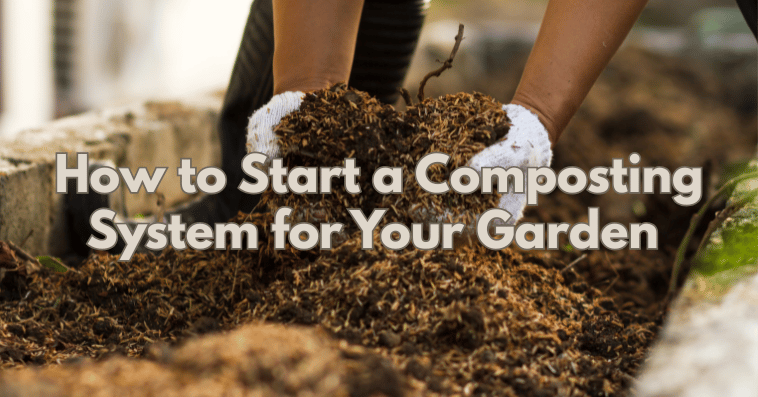If you're passionate about gardening, there’s one secret weapon that can transform your soil and supercharge your plants: compost. Composting is a natural process that turns organic waste into nutrient-rich soil conditioner. Not only does it reduce household waste, but it also improves soil health, promotes plant growth, and supports sustainable gardening. Whether you're a seasoned gardener or just getting your hands dirty for the first time, starting a composting system at home is easier than you think.
In this guide, we’ll walk you through everything you need to know about how to start a composting system for your garden, step by step.
What is Composting?
Composting is the process of breaking down organic material like kitchen scraps, garden waste, and leaves into humus—a dark, crumbly soil amendment packed with beneficial microbes and nutrients. Compost enriches your garden soil, helps retain moisture, and reduces the need for chemical fertilizers.
Benefits of Composting for Gardeners
Before diving into the how-to, let’s understand why composting is essential for every gardener:
Reduces landfill waste by up to 30%
Enriches soil with essential nutrients
Improves soil structure and aeration
Increases water retention
Supports beneficial microbes and worms
Saves money on chemical fertilizers
Choose the Right Composting Method
There are several composting methods based on space, time, and effort. Choose one that fits your lifestyle:
1. Backyard Composting (Bin or Heap)
Ideal for medium to large gardens.
Uses a compost bin or open pile.
Great for kitchen and garden waste.
2. Vermicomposting (Worm Composting)
Perfect for apartments or small spaces.
Uses red wigglers to break down organic matter.
Produces rich worm castings, aka “black gold.”
3. Bokashi Composting
Ferments food waste using beneficial microbes.
Works well indoors with little odor.
Fast composting cycle (2–4 weeks).
How to Start a Composting System: Step-by-Step
Step 1: Select a Compost Bin or Area
You can buy a compost bin or make your own. Choose a location that is:
Shaded or semi-shaded
Well-drained
Easily accessible
Options include:
Enclosed plastic bins (great for odor control)
Wooden pallets or wire mesh enclosures
Tumbling composters for faster decomposition
Pro Tip: Get compost bins and tools easily from trusted gardening stores like PaudheWale.
Step 2: Understand the Composting Ingredients
Compost needs the right balance of greens (nitrogen-rich) and browns (carbon-rich) to decompose efficiently.
✅ Greens (Nitrogen)
Vegetable peels
Fruit scraps
Coffee grounds
Grass clippings
Tea bags (non-plastic)
✅ Browns (Carbon)
Dry leaves
Newspaper (shredded)
Cardboard
Sawdust
Straw or hay
Ideal Ratio: 3 parts browns to 1 part greens
Step 3: Build Your Compost Pile
Layer your materials to kickstart decomposition:
Start with a base of coarse browns (twigs, dry leaves) to aid airflow.
Add alternating layers of greens and browns.
Moisten each layer lightly—your compost pile should feel like a wrung-out sponge.
Step 4: Maintain the Pile
Maintenance is key to healthy compost:
Turn the pile every 1–2 weeks to add oxygen and speed up decomposition.
Monitor moisture—add water if too dry, or browns if too wet.
Chop materials into smaller pieces to help them break down faster.
You’ll know your compost is ready when:
It’s dark brown and crumbly
It smells earthy (not rotten)
Original materials are no longer recognizable
This usually takes 2–4 months, depending on conditions.
What NOT to Compost
Avoid these items to keep your compost safe and pest-free:
🚫 Meat, dairy, or oily food
🚫 Pet waste
🚫 Diseased plants
🚫 Glossy/coated paper
🚫 Chemically treated wood or grass
How to Use Compost in Your Garden
Once your compost is ready, here are ways to use it:
Soil amendment: Mix compost into garden beds to boost fertility.
Mulch: Spread it on top of soil to retain moisture and suppress weeds.
Potting mix: Combine compost with soil and sand for DIY mixes.
Lawn top dressing: Sprinkle a thin layer to nourish grass naturally.
Composting Tips for Beginners
Start small: A kitchen compost bin is great for daily scraps.
Be patient: Decomposition is a slow but natural process.
Keep it balanced: Too many greens = smelly pile; too many browns = dry pile.
Get your family involved—composting can be fun and educational!
Buy Composting Supplies from PaudheWale
Ready to go green and give back to your garden? Whether you need compost bins, organic compost, red worms for vermicomposting, or gardening tools, PaudheWale has everything you need to get started.
Composting not only reduces waste but also gives your plants the natural boost they deserve. Start your composting journey today and create a garden that’s both eco-friendly and thriving.

